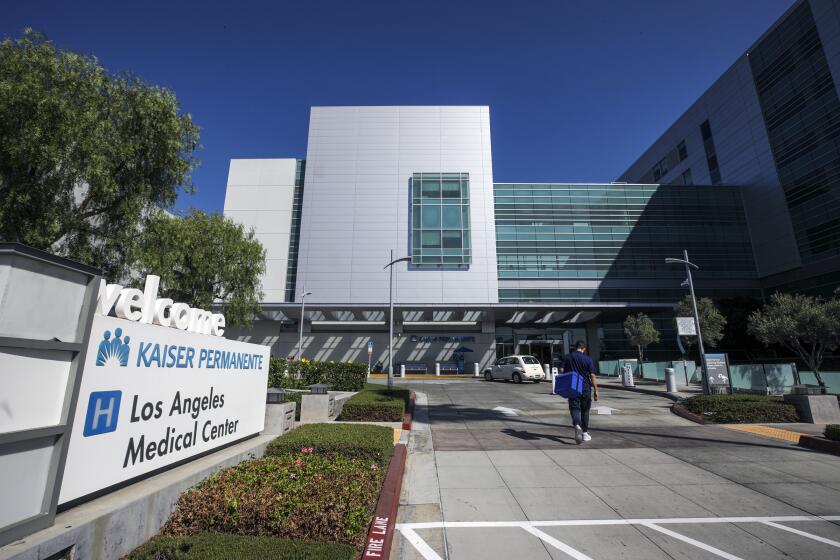Ailing Hospital to Keep Federal Funds
Health officials on Friday decided against pulling more than $200 million in federal funding from Martin Luther King Jr./Drew Medical Center, finding the hospital had submitted adequate plans for correcting widespread flaws in the way it administers drugs to patients.
“They’ve removed the immediacy” of the problem, said Steven Chickering, a manager for the U.S. Centers for Medicare and Medicaid Services. “We’re basically giving them more time to ... fix the problems.”
Dispatched earlier this month to look into the case of a meningitis patient who had been wrongly given a potent cancer drug, inspectors found that drugs had been repeatedly withheld or wrongly administered to 12 patients.
Many of these errors were directly witnessed by the inspectors, who in some cases had to intervene to prevent harm to patients at the Los Angeles County-owned hospital.
The meningitis patient, for instance, was the victim of more than 40 medication mistakes while the hospital was on notice that it had erred with the cancer drug.
Inspectors also found that medications sometimes sat for hours in the pharmacy, waiting to be delivered to patients. In addition, nurses administered incorrect doses of drugs.
In response, the Centers for Medicare and Medicaid Services threatened to pull its funding unless the problems were immediately corrected.
Fred Leaf, chief operating officer of the county health department, said the primary fixes at the Willowbrook hospital involve having multiple employees sign off on drugs before they are given to patients and adding “runners” to speed up the delivery of prescriptions to the pharmacy and drugs to the rooms. In addition, the staff will be retrained on the proper administration of medications, he said.
For now, the hospital remains out of compliance in the areas of nursing, pharmacy and quality assurance, Chickering said. The Centers for Medicare and Medicaid Services will send another team of inspectors to the hospital in coming weeks to ensure that it comes into compliance.
The revocation of federal funds would have been highly unusual, and a severe blow to one of the few hospitals serving minority and impoverished communities around South Los Angeles.
Leaf said the damage would have extended far beyond the hospital itself, to the entire health department, which already is facing a $650-million to $750-million deficit in the next few years.
“This would have been disastrous,” Leaf said. “We would have to consider much more drastic actions in terms of closing facilities and loss of services.”
Supervisor Yvonne Brathwaite Burke, who represents the district that includes the hospital, said that she had feared the latest report on the medication problems would sink the institution. It followed a host of sanctions in recent months levied by regulators and accrediting bodies.
“My reaction was, what nurse, knowing there had been all these problems, wouldn’t be more careful” during an inspection, Burke said. “How does anyone, knowing that you’re under public scrutiny and everything you do is being evaluated, how do you make these mistakes? I absolutely did not understand. And how were those mistakes not caught by someone in charge?”
But Burke said that the hospital, with its back against the wall, rallied to put in place a plan of correction.
“There was a realization that it was D-Day and obviously everyone pulled together.
“Of course, we’re not out of the woods,” she said.
At least one expert seconded that observation.
“I’d be concerned that there’s adequate resources to fix the problem long-term,” said Doug Miller, the assistant vice president and chief of pharmacy for the Grady Health System, which runs public hospitals in Atlanta. Miller reviewed the federal report at the request of The Times.
“I think what King/Drew said is reasonable” about what it can do in the short term, Miller said. “But long-term, I think other systems need to be put in place and their systems need to be upgraded.”
He said that some of the problems documented in the report were far less serious than others and indicated people were either rushing to do their jobs or forgetting standard safeguards.
When inspectors return to King/Drew in coming weeks, they also will be following up on a January report that found grave errors that contributed to the deaths of five patients, Chickering said.
At that time, inspectors concluded that nurses had been told to lie about patients’ conditions and sometimes neglected seriously ill patients for hours.
Leaf said the hospital would try to reopen unit 4B, a ward where three of the patients died after caregivers failed to respond appropriately when their conditions deteriorated, even though they were attached to cardiac monitors. The ward was closed last year.
More to Read
Start your day right
Sign up for Essential California for news, features and recommendations from the L.A. Times and beyond in your inbox six days a week.
You may occasionally receive promotional content from the Los Angeles Times.






